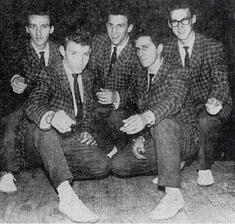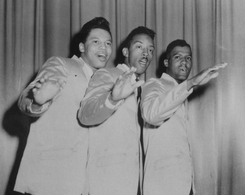-
Par dion1 le 19 May 2009 à 01:50
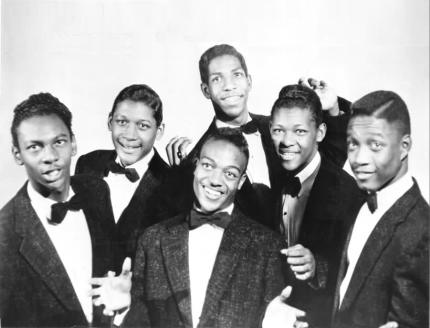
The El Dorados (1) (Chicago)
Personnel :
Pirkie Lee Moses(Lead)
Arthur Basset(Tenor)
Jewell Jones(Tenor)
Louis Bradley(Tenor)
James Maddox(Baritone)
Richard Nichens(Bass)
Discography :
The El Dorados (1)
1954 - Baby I need you / My loving baby(VeeJay 115)
1954 - Annie's answer / Living with Vivian(VeeJay 118 )
1954 - One more chance / Little miss love(VeeJay 127)
1955 - At my front door / What's buggin' you baby(VeeJay 147)
1955 - I'll be forever loving you / I began to realize(VeeJay 165)
1955 - Now that you've gone / Rock'n' roll's for me(VeeJay 180)
1956 - A fallen tear / Chop ling soon(VeeJay 197)
1956 - Bim bam boom / There in the night(VeeJay 211)
1957 - Tears on my pillow / A rose for my darling(VeeJay 250)
1957 - Three reasons why / Boom diddle boom(VeeJay 263)
1958 - Lights are row / Oh what a girl(VeeJay 302)
1970 - In over my head / You make my heart sing (Torrid 100)
1981 - She don't run around (Charly LP 1022)
1981 - Trouble trouble (Charly LP 1022)
1984 - Love my own (Solid Smoke LP 8025)
N/A - She Don’t Run Around
N/A - It’s No Wonder
N/A - Love Of My Own
N/A - Make Me A Sweetie
N/A - Trouble, Trouble
N/A - Language Of Love
N/A - Always My Love
N/A - Why Must I
N/A - Lord Knows I Tried
The El Dorados (1) with Hazel McCollum
1954 - Annie's answer / living with vivian (Vee Jay 118)
The Four El Dorados
1958 - A Lonely boy / Go! Little Susie (Academy 8138)
Biography :
One of the leading R&B vocal groups on Vee Jay, the El Dorados had a relatively short career with their first lineup, during which they scored a massive crossover hit, 1955's "At My Front Door" (number 17 on the pop charts and number one R&B, where it remained for 18 weeks). They managed only one other charting record -- 1956's "I'll Be Forever Loving You" -- before their initial breakup in 1959. Subsequent lineups and name changes (and alterations) brought no further success, but they continued performing well into the '80s.
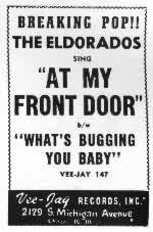
The original group featured five members -- Pirkle Lee Moses Jr. (lead), Louis Bradley (tenor), Jewel Jones (second tenor and baritone), James Maddox (baritone and bass), and Robert Glasper (bass) -- when they formed in the Englewood section of Chicago's south side in 1952 while still attending Englewood High School (the same school that the Moroccos attended). They were calling themselves the Five Stars. Johnny Moore, their high school custodian, liked the group so much and thought they showed so much promise, that he became their manager.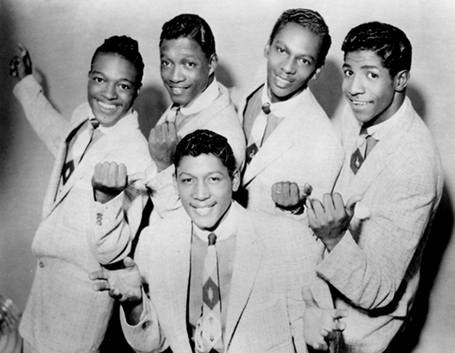
In 1954, just after graduation, Moses and Glasper took advantage of the Air Force's 90-day active duty program, but while Moses returned, Glasper remained with the Air Force. By then, Arthur Bassett (tenor) had temporarily replaced Moses, and Richard Nickens came in for Glasper. The Five Stars were now six, and a name change was inevitable. They were about to become the Cardinals (apparently, they had no knowledge of Atlantic's New York-based group) when the craze for naming your group after a popular car model hit, and since they couldn't call themselves the Cadillacs, the settled for Cadillacs' luxurious two-door model, the El Dorado, for inspiration. The El Dorados came to the attention of local Chicago WWCA disc jockey Al Benson, who witnessed first-hand how their gorgeous blend of harmonies and talent made for an exciting new group that he could support. They had already won first prize at a local talent show at the Club De Lisa. Benson arranged for the group to audition at a contest hosted by Vee Jay Records at the Park City Skating Rink. Amateur groups were challenged to compete against Vee Jay's Spaniels. The El Dorados rose to the challenge, winning the contest and a recording contract with the label.
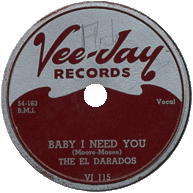
The El Dorados' first single, a bluesy ballad called "My Loving Baby," was issued in September 1954, and was a popular regional seller. Their next effort had the group backing up Hazel McCollum on "Annie's Answer," which was Vee Jay's contribution to the ongoing "Annie" saga begun by Hank Ballard and the Midnighters. Perhaps tiring of all the Annie nonsense, Arthur Bassett ankled the El Dorados (he also joined the Air Force), and the sextet slimmed down to a quintet. During the third week of September 1955, Vee Jay released the group's "At My Front Door," which stormed the Billboard R&B charts on September 24th and the Top 100 on October 15th. The song featured Al Duricati's pounding drum rhythm and a rousing sax solo. The so-called "baby talk" pre-finale by Moses Jr. made the record soar even further, and the lyrics about that "crazy little mama" became as legendary as the Annie saga. By the end of the year it had climbed to number 17 on the pop charts and number one R&B, where it remained for 18 weeks. (Pat Boone later did a cover version that charted at number seven pop).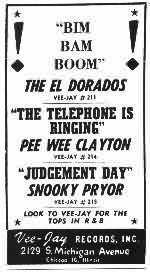
Their follow-up, "I'll Be Forever Lovin' You" (originally recorded by the Rip Chords but never released), was issued during the second week of December. It was a rocker that exuded jazz, pop, and R&B overtones, but although it made it to number eight R&B in February 1956, it never charted on the pop lists. Soon after the release of the follow-up, Nickens left and the El Dorados soldiered on as a quartet. A few additional singles performed well in certain U.S. cities, but didn't measure up to their prior hit status. Their next single, "Tears on My Pillow" (a different song from Little Anthony and the Imperials' hit record), was the last by all of the original El Dorados; soon after its release, the group and Pirkle Moses Jr. separated over a disagreement on new management.

Moses Jr. soon joined another Vee Jay act, the Kool Gents, who had been left without a singer when their frontman, Dee Clark, departed for a solo career. John McCall (tenor), Douglas Brown (second tenor), Teddy Long (second tenor and baritone), and Johnny Carter (bass) of the Kool Gents joined with Moses Jr., to become the New El Dorados. They released two singles in 1958 for Vee Jay, but when neither sold, they eventually left Vee Jay in a money dispute and subsequently disbanded altogether.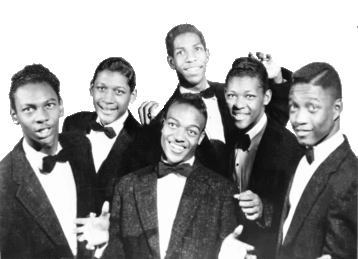
During this same time, the remaining El Dorados -- Jones, Bradley, and Maddox -- joined up with new lead singer Marvin Smith. Smith had moved with his family to the west side of Chicago in the late '40s, where he attended Crane High and sang on street corners and in church choirs, before joining the group as their new lead vocalist. To avoid legal problems with Vee Jay, the group's name was changed to Those Four El Dorados for 1958's "A Lonely Boy," Academy Records of Chicago. Jewel Jones' name on the label was spelled J-u-e-l-l (each member's name was listed). Those Four El Dorados' later traveled to the West Coast, and connected with a former NBA basketball star Don Barksdale, who had formed his Rhythm Record Company in Oakland, CA. The group changed monikers again, this time calling themselves the Tempos, but the group faltered again, and returned to Chicago, splitting up in 1961.
Bryan Thomas
http://www.destinationdoowop.com/eldorados.htm
http://home.earthlink.net/~jaymar41/eldos.html
http://home.att.net/~marvart/Eldorados/eldorados.html
CD :MP3 :
 your comment
your comment Follow this section's article RSS flux
Follow this section's article RSS flux Follow this section's comments RSS flux
Follow this section's comments RSS flux
Doo Wop - Rhythm & Blues - Mail : jcpiazza26@gmail.com


